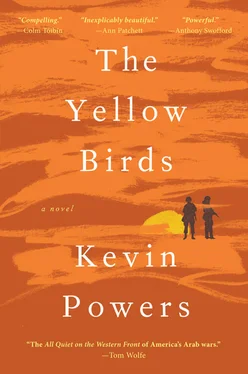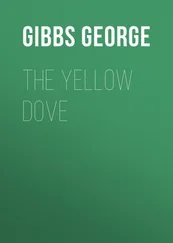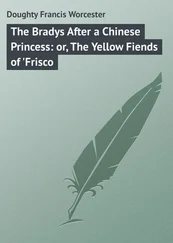When they last saw him, the bleeding boy approached the beggar, who in his sackcloth still crouched down warily, gathering his pastiche of discarded melon rinds and bread crusts. A knot of flies swarmed about his head, glittering in the yellow light cast off the streetlights of their audience, and the beggar took no pause to shoo them. The man said that he and the shopkeeper were like all the others, stunned and amazed by what they’d seen. Spotlit against the wall of an old crumbling hovel, the old man grabbed Murph by the hand and led him into the dark.
He looked to the interpreter and then to us. “They go down the alley…gone.” We cut him free of his bindings, then turned northwest toward the circle. Our boots impacted softly against the dust, which settled like lime on the legs of our pants. Birds and shadows were caught quickly by our eyes, then returned to a fluttering periphery of hollow noises: a motor in the distance, an old man breathing from a doorway, the tails of his wife’s robes softly dragging across a mud floor. We moved until over the crest of a low rise we saw lights splayed out in all directions.
We neared the circle and spread out on its edge. A daze had set in on the roundabout’s occupants. They walked back and forth between one another’s cars, speaking in low voices, hands pointing wildly as if to map out the strange turns that life, in peculiar moments such as this, can take.
Before entering into the light of the circle, we checked our weapons and determined likely threats. Someone shrugged. We rose out of the fringes of the dark, our forms modular and alien to the men standing there. Most of them ran off. We knew they ran for fear of us, so we didn’t follow them. Others got in their cars and peeled loudly down the street, their antique engines high and whistling, the smell of rubber adding to the odor of decomposition that permeated the air.
We searched the perimeter of the circle. The streetlights gave off a shallow hum. The abandoned cars were warm and made little ticking noises at irregular intervals. We looked for signs of Murph in the shadows, some indication of his passage. In a hidden alley, obscured by a tattered green awning, a private called out.
On his knees, he sifted through a pile of discarded fruit, rotten and blanketed by a collection of flies. We walked over to him and watched as he kneaded his hands through the soggy mass. Flies battered him lightly. He made a small clearing in the alley and a puddle showed itself blackly against the spoiled citrus. The smell of copper stagnated and mixed with the remnants of the beggar’s scavenged fruit.
“That’s blood,” someone said. A light shined down the alley. We followed the footprints, which gently reflected the light, directing us toward a maze that vanished down staircases and around unmapped corners. We checked our weapons again, quietly reasserting our confidence under the whispering noise of metallic levers shifting position, and walked down the alley.
In the dark, a swallow illustrated the turns with its call’s echo. It guided us to a hub, where the alley branched off in several directions. An old man gauzed in dusty sackcloth and smelling of rotten fruit lay prostrate in the center. Someone tapped at him with his boot. No response. The blood, not yet congealing, adhered to the boy’s boot and dripped in the moonlight. We turned the beggar over. The stench of calloused and picked-at sores, now burst from the beating he had taken, overpowered us. The gray of pallor mortis settled quickly over his wrinkled skin, becoming paler and paler as we stood there.
Sergeant Sterling chewed his bottom lip in the dark over the indrawn form of the dead man, his hands stuck casually in his pockets. His rifle hung loosely from its sling.
“What now?” we asked.
Sterling looked back and shrugged. “Shit, I ain’t got a clue.”
The dead man seemed to move for a moment as we stood there, but it was only an effect of the rigor, the slight contraction of dead muscles over his brittle bones. It seemed impossible to know which path to take. We scoured the stonework for signs of footprints. The fear began to set in that Murph had bled out on his journey and been swept up into the arms of captors, too weak to resist, as helpless as a child asleep in the wilderness. We could not avoid thinking of him sleeping in that alley, being found by men who would take him to a basement, burn him and beat him, cut off his balls and cut his throat, make him beg for death.
We followed one soldier as he walked west toward the sloping banks of the river. It was as good a guess as any other. A mosque’s towering minarets fooled the eyes and appeared to curve and hover over everything.
The sun began to rise. Colors, dull and bathed in the pale light, spread over the city in a palette of gray and gold and washed-out pastels. The morning heat began to swell our brains as we neared the river. We knew other units were searching for Murph. We heard the rattle of gunfire and the occasional reverberant slam of IEDs. But we encountered no resistance. The people we saw parted before us as quickly as they could. We walked down either side of a broad avenue that was lined by the hulks of cars set on fire in some recent past.
On the outskirts of the city we approached an open square. Two black mutts of indeterminate parentage heeled at the feet of their master. His dogs and his white shift stood out in the fallow bleakness. He affixed a three-legged mule to a cart. A wood-hewn contraption stood substitute for the mule’s stumped right foreleg. He glanced at us, twenty heavily armed soldiers, and looked back disinterestedly to his work on the cart. We sent our interpreter to see what information, if any, he could give us. Then we waited, seated lazily about the square aiming our rifles at the few open windows and down the empty side streets.
They exchanged words, and the cartwright turned toward one of the side streets and pointed out a minaret of the mosque we had passed earlier. It jutted precariously over the bank of the river, a protuberance of mottled stone. There was nothing between us and the tower but a road and barren fields.
Sergeant Sterling fiddled with his sight aperture, flipping it back and forth from night sight to day sight while trying to decide what we should do. Finally, he spit onto the dusty road and said, “They ain’t much for crop rotatin’, are they?” He paused again. “What’s he saying?” he asked the interpreter.
“He saw some men he didn’t know going into the minaret last night.”
“How many?”
“Five. Maybe six.”
“They look strange or anything?”
The interpreter looked confused. “Compared to what?”
Sterling squatted down on the backs of his calves. “All right, you guys set up a perimeter here,” he said to the rest of the platoon. “Me and Bartle are gonna check it out. It’s probably nothing.”
The cartwright offered to guide us to the tower. He led, followed by his elaborately improvised mule drawing the whole of his earthly possessions. He goaded the mule along. It consented with patient eyes and marked his path with a tripartite staccato of hoofbeats, the blunted wood of his other leg capped with wrappings of molded leather. In the back of his cart, a worn prayer mat covered a few pots of clay and stone. Items of cast iron wobbled about, shaking among a collection of woven figurines beaded in natural shades of turquoise and crimson and green.
On the side of the road a tree rose out of the otherwise sterile field, bent and swaying softly in the stale breeze. The smell of the river got stronger as we approached the minaret, a sweet coolness we had long forgotten. Past the tree and the smell of the river, the faded pink and blotchy minaret loomed at an odd angle, a dominant line through the corners of my eyes. The hermit tapped at the mule’s hindquarter with a long crook of charred cedar, communicating in this fashion a command for the mule to halt. The mule brought his momentum to a stop and as the cart rolled its last few feet, the mule hopped on its wooden contrivance, its face a picture of stillness and calm.
Читать дальше












